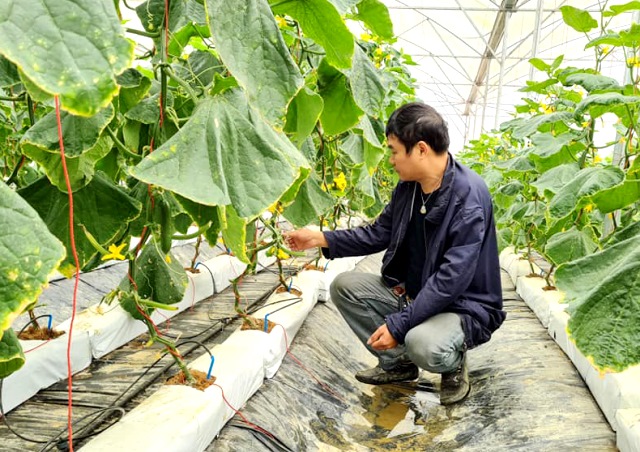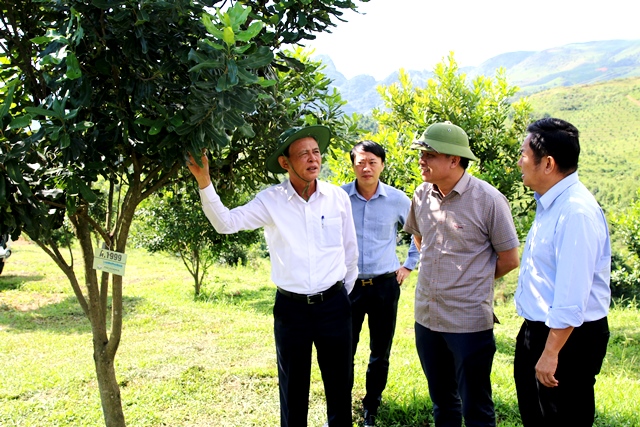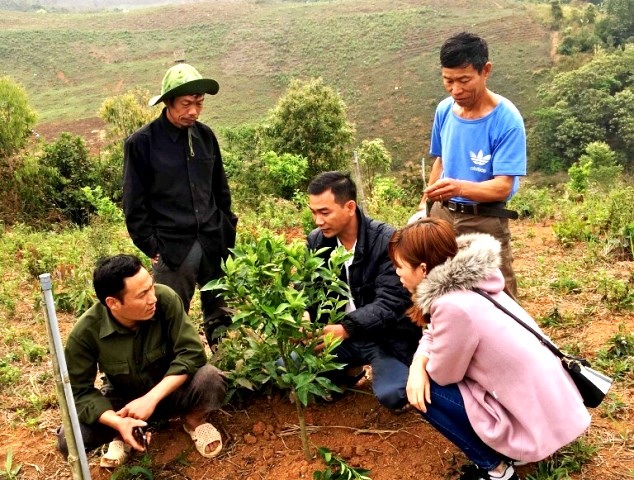Dien Bien aspires to develop
Dien Bien, being a huge natural area with almost 1 million hectares, has a lot of land potential, especially land for agricultural and forestry development, which accounts for nearly 80% of the total. In addition to a large area of unused agricultural and forestry land, the climate and soil in Dien Bien is also rich and diverse, which is a favorable condition for the development of many types of agricultural and forestry products with economic value. Typically, the Muong Thanh field is often the largest in the Northwest region, producing the famously excellent Dien Bien rice specialty and providing a significant source of revenue for farmers. Typically, the Muong Thanh field is often the largest in the Northwest region, producing the famously excellent Dien Bien rice specialty and providing a significant source of revenue for farmers such as Bac Thom No. 7; Seng Cu... Many enterprises have also invested in producing high-quality rice in the Muong Thanh field, which has brought many benefits to the community in addition to ensuring food security for the locality.
The province has a large land area, many hills and abundant natural food sources, so Dien Bien soon took advantage of this advantage to develop cattle raising, especially in the districts: Dien Bien Dong, Muong Nhe, Muong Cha, Tuan Giao. The application of technological improvements has boosted the development of commodity-oriented livestock production in Dien Bien in recent years, resulting in amazing efficiency, greatly increasing people's income, and contributing to local agricultural economic prosperity.
Strategies and programs to develop agro-forestry production have been adopted in a systematic manner in recent years in order to promote and maximize the potentials and advantages of local agricultural production development such as: Fruit tree development scheme; Project on sustainable development of grazing cattle (buffaloes, cows, goats) along the value chain associated with the product consumption market; Project on sustainable forestry economic development in Dien Bien province in the period of 2021-2025 with orientation to 2030.

Mr. Lo Van Tien, Vice Chairman of the Provincial People's Committee said: Implementing the Resolution of the 14th Provincial Party Committee, the Provincial People's Committee has issued 2 plans and 4 projects. It is the restructuring of the agricultural sector; new rural construction development plan. As for the project, there are currently livestock development projects, fruit tree development projects, forestry development projects and OCOP product development projects. With the implementation and approval of the above projects, this is a very basic orientation for Dien Bien in developing agro-forestry in the next 5 years. At the same time, it is the basis for all levels and sectors, especially, businesses, organizations, individuals and people to rest assured to focus on production development.
Along with the promulgation of plans and schemes, the province is currently reviewing mechanisms and policies. In addition to the mechanisms and policies of the Central Government, the province has researched and developed provincial policies, focusing on attracting investment from businesses to the province. With the province's policies and concerns, it is hoped that in the upcoming time, agriculture will prosper.
Another feature in Dien Bien's agro-forestry growth is the development of crops on sloping land, which provides economic benefits to the inhabitants while also attracting investment. For example, on Muong Ang land, firms and individuals have engaged carefully in coffee production throughout the years, yielding remarkable results. Although there have been years of falling into a situation of good crops but losing prices, gaining prices but losing crops, coffee is still an important crop for Muong Ang to reduce poverty. At the same time, after many years of finding solutions to overcome difficulties, coffee trees in Muong Ang now and in the near future as well as in the distant future will be developed stably.

Dien Bien uses the land's potential to grow industrial crops and other multi-purpose crops including tea, rubber, macadamia, and medicinal plants in addition to coffee. These crops not only increase crop efficiency on the same amount of land as traditional crops, but they also play an essential role in influencing people's perceptions of economic development. The macadamia tree has shown to be the most effective of all the crops produced on Dien Bien's steep soil thus far. Because this is a multi-purpose plant, in addition to harvesting seeds with high economic value in the long run, macadamia can also green bare land, barren hills and can be used as protection forests with the ability to limit leaching and soil erosion.
The province has also approved investment policies for 14 projects of growing macadamia trees with a total registered capital of 16.213 billion VND, the scale of concentrated planting approved for implementation is 97.515 ha in the areas of Dien Bien, Dien Bien Dong, Tuan Giao, Muong Ang, Tua Chua, Muong Nhe, Nam Po districts and Dien Bien Phu city. This is a new opportunity for agro-forestry development in Dien Bien both in the near future and in the distant future.
Currently, Dien Bien province has nearly 3,000 hectares of production plantations, of which nearly 2,000 hectares of production plantations have reached the age of exploitation (with the main plant species being Acacia mangium, Magnolia chevalieri, eucalyptus, and Chukrasia tabularis, Cleistocalyx operculatus, etc.), with a reserve of about 151 thousand m3 of wood. Besides, the area of land planned for forestry, and the relatively large forest area are suitable for developing non-timber forest products (both under the forest canopy and on bare land) in the direction of concentration associated with processing, etc.
Develop production forests with rubber trees, pine trees, dalbergia hupeana trees, particle board materials, and pulp with a planned area of hundreds of thousands of hectares. In particular, Muong Nhe Nature Reserve with a relatively large area of primary forest with a variety of animals and plants is still a valuable resource for conservation, construction and formation of a national park in this area. These are advantages to exploit, develop forestry, create diverse and high-quality forest products associated with processing industry.

With the goal of developing concentrated raw material areas to attract investment in processing, the province has been continuing to pay attention to investing in forest development, and simultaneously facilitating to encourage localities and economic sectors (especially enterprises) to invest in the development of production plantations in the province.
When exploiting the strengths of agricultural and forestry development as the mainstay, Dien Bien also focuses on investing in tourism as an economic spearhead. Because Dien Bien is the center of the Arc of Northwest, it is the only province in the Northwest provinces that has an air route connecting Hanoi and Ho Chi Minh city. From Dien Bien, it is convenient to travel to the Red River Delta provinces, the Southern provinces, the Upper Laos provinces and the link to ASEAN countries. On the other hand, Dien Bien is a land with a famous historical complex of five continents, known by a large number of domestic and foreign tourists with a wish to set foot in Dien Bien.
Dien Bien clearly demonstrates its adaptability and creativity in capitalizing on opportunities and advantages for economic development. Simultaneously, Party committees, governments at all levels, collectives, and individuals in the province actively approach new economic development solutions of localities throughout the country and apply them in accordance with Dien Bien conditions. The top priority solution is to promote investment attraction and increase production through the mode of association, and production along the value chain. Simultaneously, strengthen advertising, trade promotion, and product branding to achieve a breakthrough in all forms of economic development, from key to spearhead.
Translated by Thanh Hoa